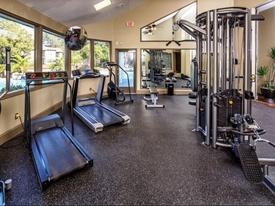Exercise two times a day anyone?

malins2
Posts: 154 Member
I work out 6-7 days a week and some of the days I work out am and pm. I do very different types of training, and feel great and energized most of the time. But some people I know think it's too much and say it's not good to do that. What do you think?
0
Replies
-
I used to do big cycles to work and back, that was in effect 2 times a day, that was doable.
Now in a different job, I normally cannot go to the gym b4 work, but have on the odd occasion.
Maybe because I am not used to it,, it killed, me,
but when I worked in a gym for 18 months I did weights in the morning after my shift and cardio at night,
that was well cool.... that worked for me, depends what your job and routine are.
Everyone is different, what works for you,, ,might not work for someone else....
go with you gut lol,, b4 it goes away he he.0 -
I usually work out twice a day as well. I do circuit training in the morning before work and then long bike ride or run after work. I love it and feel so happy and relaxed at the end of the day!
The days when I am super busy and can only do one or the other I feel so weird!0 -
So I guess I should just listen to my body and mind and do what feels good! Which is what I'm already doing, but had to ask since some people seem to think it's not right!0
-
I too workout 6-7 days a week and often do two workouts per day. However, I have to say, they are not HUGE workouts. I typically do some Turbo Jam or the Stationary bike or maybe a 40 minute fast walk in the morning, then jump on the bike for 20 minutes or maybe a quick strength training work out in the evening. I agree, it keeps me energized and I miss it when I don't do it.
I cannot imagine anyone would think the extra workout would somehow not be good for you......doesn't really make sense. Unless it became obsessive or something and you were to thin? But otherwise I would think it's GREAT!0 -
sometimes I work out twice in a day, but not as a constant thing, usually if I am going out for a special occasion or something and need an extra burn or when I'm really trying to slim down quick.
I work in a gym now, so I can see myself putting in double workouts more often just because I can.0 -
Its not unusual for me to workout more than once a day. Sometimes I do a cardio at Jazzercise, but also an hour walk, or weight training, or swimming, or Tai Chi.
i'm retired, so I can take a walk after breakfast, weight train in the afternoon and still take a Jazzercise class in the evening if I want. I do that now and then, but more often I do any two of the above in one day. Sometimes I choose to do two back-to-back Jazzercise classes.
Its a rare day that I do no form of exercise.0 -
I believe it's overkill to eo it everyday. Sometimes I will do both strength and cardio If I have time & energy, but I don't always.0
-
I do 1.5 hr workout in the morning, hard workout. After work I walk . Sometimes I do something else as well. Evaluate how your body feels. Are you too tired or sore? Lots of headaches? If you're feeling good and not burning yourself out, you should be okay. But you are the only one who knows how your body feels.0
-
I used to work out twice a day. My nutritionist got upset with me because I was working out on an empty stomach after waking from a full night of sleep. I stopped working out 2x a day. She couldn't feed me enough and I wasn't losing weight to support the workouts.
Now I work out 4x a week and I am losing more consistently. I also sleep better and my muscles seem to hurt much less. I'm losing far more inches now than ever before.
It depends on what you want. I'm trying to lose and tone. If you are maintaining and you love to work out.. then do what you do. Feed your body though.0 -
Lunch workout : I do half hour "Warm up" cardio (5K on threadmill or 30 min on elliptical) followed by 30-45 min weights (though I often have to squeeze it into shorter amount by removing hte rest periods--and using opposite muscle group exercises for "rest")
Evenings: I coach kids, I do kickboxing for an hour twice a week, I teach my kids weightlfiting a couple times a week (and lift some weights, mostly its arms workouts, sometimes shoulders, depending on how the week schedule comes out)
Sunday evenings I play hockey, sometimes I also play table tennis in the afternoon.
Lots of two-a-days 0
0 -
My personal schedule (and attention span) don't allow me to do one big work out a day like somem people do so I guess I work out multiple times a day and everyday of the week, I feel like I wasted a day if I don't. I just work it into my schedule.
Before work I do a 20 - 30 minute really speedy uphill/downhll walk with my dogs.
At work on break I do a 20 - 40 minute video circuit. Later in the day at work I alternate between doing about 40 minutes of cardio or some weights.
Night time I do a good 40 - 60 minute fast paced walk again with the dogs.
Weekends I tend to not do as much structure and just find time do a good long walk or play baseball or swim.0 -
So I guess I should just listen to my body and mind and do what feels good! Which is what I'm already doing, but had to ask since some people seem to think it's not right!
Exactly this! You are the only one that knows what is good for your body. If you enjoy working out twice a day, and it feels good, go for it.
There are days (not very often) when my body wants a second workout and I work out.0 -
Most days of the week, I do two workouts a day but they are very different. The morning routine is a Bodyweight circuit training workout, the evening routine is my martial art practice. It works very well for me.0
-
If I get in the mood for a double workout I go and I ALWAYS feel better that I was motivated enough to go twice in one day.
I say listen to your body if it gets to be too much you will know.0 -
I love when I get two workouts in one day. I try for cardio in morning and weights in the evening or vice versa. I just feel better when I do. I absolutely hate rest days, but I know they are necessary. I say just keep doing what feels right for you, some times people forget everyone is different and what works for them may not work for you.0
-
I used to.. BUT this last week I tried to just work out once a day, and it seems it worked cause I lost 4.2 lbs

So I might stay that way!0 -
I exercise several times a day around 15-20 minutes and 1 45-60 minute workout. At the minimum I do 90 minutes a day.0
-
i wish i could work out twice a day, be grateful you have the time for it!0
-
I think for me it wouldn't be feasible to work out 6-7 days a week, sometimes working out twice a day.
My life includes exercise but exercise isn't my life.
I enjoy meeting friends for coffee, art galleries, playing the ukulele, walking my dog, do volunteer work and sometimes oil painting. I just have too many fun hobbies I love to do besides exercising.0 -
Sometimes if i feel that i haven't worked out enough i will work out twice (:
I think that it's up to you and if you enjoy working out twice a day then go for it and that you should.
It's not always about what is right or wrong.
Just rather if you feel good about doing it (:0 -
It's fine as long as you eat for it and rest when you need it.
I used to have to commute 2 hours per day on my bicycle then walk around through breast-height grass for hours doing field work.
I ate like a horse, haha.0 -
Just keep yourself familiar with the symptoms of overtraining, and dial it back if you need to. Here's a pretty good list of the symptoms, courtesy of marksdailyapple.com
1. You repeatedly fail to complete your normal workout.
I’m not talking about normal failure. Some people train to failure as a rule, and that’s fine. I’m talking failure to lift the weights you usually lift, run the hill sprints you usually run, and complete the hike you normally complete. Regression. If you’re actively getting weaker, slower, and your stamina is deteriorating despite regular exercise, you’re probably training too much. Note, though, that this isn’t the same as deloading. Pushing yourself to higher weights and failing at those is a normal part of progression, but if you’re unable to lift weights that you formerly handled with relative ease, you may be overtrained.
2. You’re losing leanness despite increased exercise.
If losing fat was as easy as burning calories by increasing work output, overtraining would never result in fat gain – but that isn’t the case. It’s about the hormones. Sometimes, working out too much can actually cause muscle wasting and fat deposition. You’re “burning calories,” probably more than ever before, but it’s predominantly glucose/glycogen and precious muscle tissue. Net effect: you’re getting less lean. The hormonal balance has been tipped. You’ve been overtraining, and the all-important testosterone:cortisol ratio is lopsided. Generally speaking, a positive T:C ratio means more muscle and less fat, while a negative ratio means you’re either training too much, sleeping too little, or some combination of the two. Either way, too much cortisol will increase insulin resistance and fat deposition, especially around the midsection. Have you been working out like a madman only to see your definition decrease? You’re probably overtraining.
3. You’re lifting/sprinting/HIITing hard every single day.
The odd genetic freak could conceivably lift heavy, sprint fast, and engage in metabolic conditioning nearly every day of the week and adequately recover, without suffering ill effects. Chances are, however, you are not a genetic freak with Wolverine’s healing factor. Most people who maintain such a hectic physical schedule will not recover (especially if they have a family and/or a job). Performance will suffer, health will deteriorate, and everything they’ve worked to achieve will be compromised. Many professional athletes can practice for hours a day every day and see incredible results (especially if they are using performance enhancing substances), but you’re not a professional, are you?
4. You’re primarily an anaerobic/power/explosive/strength athlete, and you feel restless, excitable, and unable to sleep in your down time.
When a sprinter or a power athlete overtrains, the sympathetic nervous system dominates. Symptoms include hyperexcitability, restlessness, and an inability to focus (especially on athletic performance), even while at rest or on your off day. Sleep is generally disturbed in sympathetic-dominant overtrained athletes, recovery slows, and the resting heart rate remains elevated. Simply put, the body is reacting to a chronically stressful situation by heightening the sympathetic stress system’s activity levels. Most PBers who overtrain will see their sympathetic nervous system afflicted, simply because they lean toward the high-intensity, power, strength side.
5. You’re primarily an endurance athlete, and you feel overly fatigued, sluggish, and useless.
Too much resistance training can cause sympathetic overtraining; too much endurance work can cause parasympathetic overtraining, which is characterized by decreased testosterone levels, increased cortisol levels, debilitating fatigue (both mental and physical), and a failure to lose body fat. While I tend to advise against any appreciable amount of endurance training, chronic fatigue remains an issue worthy of repeating. Being fit enough to run ten miles doesn’t mean that you now have to do it every day.
6. Your joints, bones, or limbs hurt.
I’m unaware of any clinical tests that can identify overuse injuries specifically caused by overtraining, but don’t you think that pain in your knee might be an indication that you should reassess how you exercise that knee? In the lifts, limb pain can either be DOMS (delayed onset muscle soreness) or it can indicate poor technique or improper form; DOMS is a natural response that should go away in a day or two, while poor form is more serious and can be linked to overuse or overtraining. With regard to endurance training, if you creak, you wince at every step, and you dread staircases, it may be that you’ve run too far or too hard for too long. The danger here is that your daily endorphin high has over-ridden your natural pain receptors. You should probably listen to them more acutely. I tuned them out for longer than I should have and it cost me my career as a marathoner (so I got that going for me, which is nice).
7. You’re suddenly falling ill a lot more often.
Many things can compromise your immune system. Dietary changes (especially increased sugar intake), lack of Vitamin D/sunlight, poor sleep habits, mental stress are all usual suspects, but what if those are all locked in and stable? What if you’re eating right, getting plenty of sun, and enjoying a regular eight hours of solid sleep each night, but you find yourself getting sick? Nothing too serious, mind you. A nagging cough here, a little sniffle or two there, some congestion and a headache, perhaps. These were fairly normal before you went Primal, but they’ve returned. Your immune system may be suffering from the added stress of your overtraining. It’s an easy trap to fall into, simply because it’s often the natural progression for many accomplished athletes or trainees looking to increase their work or improve their performance: work harder, work longer. If you’ve recently increased your exercise output, keep track of those early morning sore throats and sneezes. Any increases may indicate a poor immune system brought on by overtraining.
8. You feel like crap the hours and days after a big workout.
Once you get into the swing of things, one of the great benefits of exercise is the post-workout feeling of wellness. You’ve got the big, immediate, heady rush of endorphins during and right after a session, followed by that luxurious, warm glow that infuses your mind and body for hours (and even days). It’s the best feeling, isn’t it? We all love it. What if that glow never comes, though? What if instead of feeling energetic and enriched after a workout, you feel sketchy and uncomfortable? As I said before, post-workout DOMS is completely normal, but feeling like death (mentally and physically) is not. Exercise generally elevates mood; if it’s having a negative effect on your mood, it’s probably too much.
How about you, readers? Do you have any tried-and-true indicators that your body has had more than it can handle? Let me know, and check back next week for information on how to avoid, mitigate, and respond to overtraining.
Read more: http://www.marksdailyapple.com/overtraining/#ixzz1u3WVm14E0 -
It would depend on the intensity of your training and your recovery ability. Some days I do HIIT in the AM then heavy weight training in the PM. Or heavy weight training both AM and PM, different muscle groups of course. But I wouldn't do HIIT twice a day.0
-
I have a really sedentary lifestyle so I try to get in as much exercise as I can outside of the 8-6 timeframe. Two workouts should be fine if your body can handle them! :bigsmile:0
-
I say you look great
 and you feeel great! so keep doing what you are doing! You get that nice natural endorphin high twice a day !!! 0
and you feeel great! so keep doing what you are doing! You get that nice natural endorphin high twice a day !!! 0 -
I don't workout twice a day now, but I'd like to maybe 2 days a week. I think about getting up early and working out before work all the time, but I never make it LOL. I usually just workout 5 evenings a week now. I might start. Seems like it works for most on this thread.0
-
being that I spen a lot of time at home, I exercise just to keep moving several times a day sometimes.0
-
I work out 6-7 times a week and one day a week i work out twice in the day. Zumba in the morning and an 8 mile run in the afternoon. I am happy with this my workouts last from 40 minutes to 2 hours depending on what I am doing. After a shorter run I will sometimes do weights after it depends on time. I also always walk the children to school it is 10 minutes both ways so maybe that counts too. I work nights and try to fit in a run on these days. My husband was cross with me today because I was so determined to run I didnt leave time to eat and ended up eating leftovers instead. Healthy leftovers but still leftovers.0
This discussion has been closed.
Categories
- All Categories
- 1.4M Health, Wellness and Goals
- 398.1K Introduce Yourself
- 44.7K Getting Started
- 261K Health and Weight Loss
- 176.4K Food and Nutrition
- 47.7K Recipes
- 233K Fitness and Exercise
- 462 Sleep, Mindfulness and Overall Wellness
- 6.5K Goal: Maintaining Weight
- 8.7K Goal: Gaining Weight and Body Building
- 153.5K Motivation and Support
- 8.4K Challenges
- 1.4K Debate Club
- 96.5K Chit-Chat
- 2.6K Fun and Games
- 4.8K MyFitnessPal Information
- 12 News and Announcements
- 21 MyFitnessPal Academy
- 1.5K Feature Suggestions and Ideas
- 3.2K MyFitnessPal Tech Support Questions























